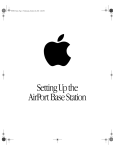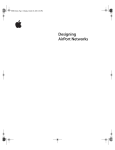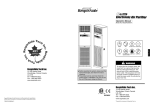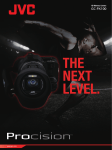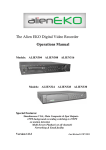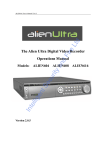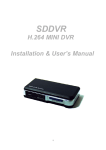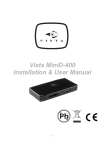Download Apple AIRPORTCARD - Airport Networking Network Card Specifications
Transcript
LL0892.book Page 1 Monday, September 27, 1999 5:16 PM About Your AirPort Card Includes general information about the AirPort Card and AirPort software LL0892.book Page 2 Monday, September 27, 1999 5:16 PM LL0892.book Page 3 Monday, September 27, 1999 5:16 PM 1 About Your AirPort Card With the AirPort Card installed in your computer, you can do the following: m Access an AirPort network at your work or school and use it to browse the Internet, send and receive e-mail, and more. m Set up a direct link between two or more AirPort-equipped computers (known as a “computer-to-computer” AirPort connection). You can use the link to play multiplayer games. m Set up an AirPort network using your computer as a base station and provide Internet access to other AirPort-equipped computers. You can also set up an AirPort network using an external device called an “AirPort Base Station,” available from your Apple-authorized dealer or The Apple Store at www.apple.com/store About AirPort AirPort technology offers an easy and affordable way to provide wireless Internet access anywhere in your home or classroom. Instead of using traditional cabling to create a network, AirPort uses wireless local area network (LAN) technology to provide wireless communication between multiple computers. 3 LL0892.book Page 4 Monday, September 27, 1999 5:16 PM How AirPort Works In a traditional network, computers are connected through a series of wires that transfer information between the different computers on the network. With AirPort, data is transferred between computers over a wireless network using radio waves. There are two ways to create a wireless network. When two or more AirPort-equipped computers are in range of one another, they can use AirPort to communicate directly. This connection is known as a “computer-to-computer” AirPort connection. You can create a more permanent wireless network using a device known as a “base station.” In this kind of network, all wireless communication goes through the base station to other computers on the network or to the Internet. How AirPort Provides Wireless Internet Access The following are ways that you can use AirPort technology to provide Internet access to AirPort-equipped computers: m Connect an AirPort Base Station (available from your Apple-authorized dealer or The Apple Store at www.apple.com/store) to an existing network that already has Internet access, such as in a school or small office. m Connect a telephone line, cable modem, or DSL modem to an AirPort Base Station. The AirPort Base Station establishes an Internet connection and also creates a wireless network though which multiple computers can get access to the Internet. m Share the Internet connection (phone line, cable modem, or DSL) of a single AirPortequipped computer with other wireless-equipped computers. When the other computers need to access the Internet, all information passes through the computer with the Internet connection. Note: To use AirPort to access the Internet, you must have an account with an Internet service provider (ISP). In addition, you need to have a traditional way to access the Internet, either through a phone line, cable, or DSL modem. 4 LL0892.book Page 5 Monday, September 27, 1999 5:16 PM Setting Up Your Computer to Use AirPort Step 1: Install the AirPort Card Instructions for installing the AirPort Card are found in a separate booklet that came with the card. Follow the instructions provided in the booklet to install the AirPort Card in your computer. The AirPort Card has been designed so that you can install it yourself. If, after reading the instructions, you feel uncomfortable about installing the card, you can have an Apple-authorized service provider install it for you. If you follow the instructions, you should not be concerned about damaging your computer. However, if you do attempt to install the AirPort Card yourself, any damage you may cause to your equipment will not be covered by the limited warranty on your computer. See an Apple-authorized dealer or service provider for additional information about this or any other warranty question. Consult the service and support information that came with your computer for instructions on how to contact an Apple-authorized service provider or Apple for service. Warning If the instructions for installing the AirPort Card in your model of computer are not included with the AirPort Card, check the Apple AirPort Web site at www.apple.com/airport, or the Apple Support Web site at www.apple.com/support Do I need to know the AirPort ID of my AirPort Card? If you are going to use your computer on a large AirPort network, such as in a school or office, you may need to provide the AirPort ID (also known as the “MAC Address”) of your AirPort Card to your network administrator. The AirPort ID, a 12-digit alphanumeric value printed on a label on the AirPort Card, can be used by the network administrator to provide an extra level of security for the network. Do I need to install an AirPort antenna? The antenna used by the AirPort Card is already built into your computer. The only part of the antenna that you will see is the connector on the end of the cable that you attach to the AirPort Card. 5 LL0892.book Page 6 Monday, September 27, 1999 5:16 PM Step 2: Set Up Your Computer to Use AirPort Depending upon when you purchased your computer, all the necessary AirPort software may or may not be already installed on your computer. m To check to see if the software is installed, open the Assistants folder on your hard disk and look for the AirPort Setup Assistant. If the AirPort Setup Assistant is present, double-click the assistant icon. The assistant will guide you through the process of setting up your computer to use AirPort. If the AirPort Setup Assistant is not present You need to install the AirPort software separately using the CD that came with the AirPort Card. If you get an error message saying the AirPort Card is not detected Shut down your computer and make sure the AirPort Card is completely inserted into the AirPort Card slot. If you are unable to detect the network you want to connect to m Make sure that you are in range of an AirPort Base Station. The typical range for AirPort communication is up to 150 feet (45 meters). Click the AirPort portion of the Control Strip to see all of the networks that are in range of your computer. AirPort Control Strip module m Try to move away from possible sources of interference, such as microwave ovens and metal walls, that may be preventing you from connecting to the network. For a complete list of sources of interference, open the Help menu and choose Mac Help, then search for “AirPort interference.” 6 LL0892.book Page 7 Monday, September 27, 1999 5:16 PM What’s Next? Additional AirPort Software In addition to the setup assistant, you can use the following software to work with AirPort: AirPort This application, located in the Apple (K) menu, allows you to switch between different AirPort networks or set up a computer-to-computer AirPort connection. AirPort Utility This application, located in the AirPort folder inside the Apple Extras folder, allows you to adjust network, routing, and security settings, as well as other advanced options. AirPort Control Strip module You can use the Control Strip to quickly switch between AirPort networks, monitor the signal strength of the currently selected network, and turn radio communication on and off. Additional Information on AirPort For more information on AirPort, see the “Wireless Internet and Networking” section of Mac Help, available in the Help menu. There you will find information on setting up an AirPort network using an AirPort Base Station, editing base station settings, avoiding sources of interference, locating additional information on the Internet, and more. In addition to Mac Help, you can find more information on the following Apple Web sites: m Apple’s AirPort Web site at www.apple.com/airport m Apple’s AirPort Support Web site at www.apple.com/support 7 LL0892.book Page 8 Monday, September 27, 1999 5:16 PM AirPort Card Specifications m Wireless Data Rate: Up to 11 megabits per second (Mbps) m Range: Up to 150 feet (45 meters) in typical indoor use (varies with building) m Frequency Band: 2.4 gigahertz (GHz) m Radio Output Power: 15 dbm (nominal) m Standards: Compliant with 802.11 Direct Sequence Spread Spectrum (DSSS) 1 and 2 Mbps standard and 802.11HR DSSS 11 Mbps draft standard 8 LL0892.book Page 9 Monday, September 27, 1999 5:16 PM Communications Regulation Information FCC Declaration of Conformity This device complies with part 15 of the FCC rules. Operation is subject to the following two conditions: (1) This device may not cause harmful interference, and (2) this device must accept any interference received, including interference that may cause undesired operation. See instructions if interference to radio or television reception is suspected. Radio and Television Interference The equipment described in this manual generates, uses, and can radiate radio-frequency energy. If it is not installed and used properly—that is, in strict accordance with Apple’s instructions—it may cause interference with radio and television reception. This equipment has been tested and found to comply with the limits for a Class B digital device in accordance with the specifications in Part 15 of FCC rules. These specifications are designed to provide reasonable protection against such interference in a residential installation. However, there is no guarantee that interference will not occur in a particular installation. You can determine whether your computer system is causing interference by turning it off. If the interference stops, it was probably caused by the computer or one of the peripheral devices. If your computer system does cause interference to radio or television reception, try to correct the interference by using one or more of the following measures: m Turn the television or radio antenna until the interference stops. m Move the computer to one side or the other of the television or radio. m Move the computer farther away from the television or radio. m Plug the computer into an outlet that is on a different circuit from the television or radio. (That is, make certain the computer and the television or radio are on circuits controlled by different circuit breakers or fuses.) If necessary, consult an Apple-authorized service provider or Apple. See the service and support information that came with your Apple product. Or, consult an experienced radio/television technician for additional suggestions. Important Changes or modifications to this product not authorized by Apple Computer, Inc., could void the FCC Certification and negate your authority to operate the product. This product was tested for FCC compliance under conditions that included the use of Apple peripheral devices and Apple shielded cables and connectors between system components. It is important that you use Apple peripheral devices and shielded cables and connectors between system components to reduce the possibility of causing interference to radios, television sets, and other electronic devices. You can obtain Apple peripheral devices and the proper shielded cables and connectors through an Apple-authorized dealer. For non-Apple peripheral devices, contact the manufacturer or dealer for assistance. Responsible party (contact for FCC matters only): Apple Computer, Inc., Product Compliance, 1 Infinite Loop M/S 26-A, Cupertino, CA 95014-2084, 408-974-2000. Exposure to Radio Frequency Energy The radiated output power of the optional AirPort Card is far below the FCC radio frequency exposure limits. Nevertheless, it is advised to use the wireless equipment in such a manner that the potential for human contact during normal operation is minimized. Industry Canada Statement This Class B device meets all requirements of the Canadian interference-causing equipment regulations. Cet appareil numérique de la Class B respecte toutes les exigences du Règlement sur le matériel brouilleur du Canada. Europe – EU Declaration of Conformity This device complies with the specifications ETS 300 328 and ETS 300 826, following the provisions of the EMC Directive 89/336/EEC. 9 LL0892.book Page 10 Monday, September 27, 1999 5:16 PM LL0892.book Page 11 Monday, September 27, 1999 5:16 PM LL0892.book Page 12 Monday, September 27, 1999 5:16 PM © 1999 Apple Computer, Inc. All rights reserved. Apple, the Apple logo, Mac, and Macintosh are trademarks of Apple Computer, Inc., registered in the U.S. and other countries. AirPort and The Apple Store are trademarks of Apple Computer, Inc. 034-0892-A Printed in Taiwan












